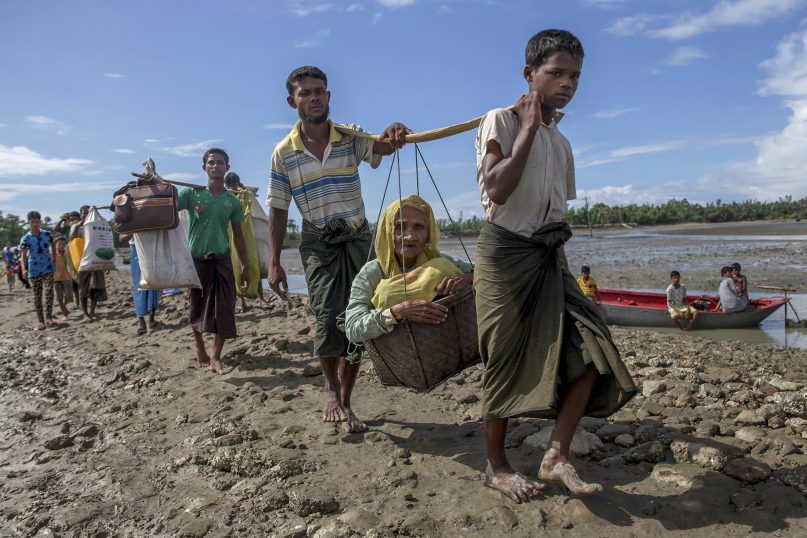
While we cannot say that global warming caused a given hurricane, hotter temperatures intensify the storms that occur. Similarly, the worldwide rise of ethno-religious chauvinism is ratcheting up the severity of particular societal conflicts.
Case in point: Myanmar.
In the southeast Asian country formerly known as Burma, tension between the majority Buddhist population and the Muslim minority — exacerbated and manipulated by the country’s rulers — is longstanding. In the 1930s, riots drove out Indians who had emigrated during British colonial rule. Another expulsion took place after Ne Win’s military coup in 1962.
Mistreatment of the Muslim people called Rohingya living on the country’s northwest coast has been a recurrent phenomenon. In 1978 Ne Win expelled 250,000 of them to adjacent Bangladesh. (A year later, following an agreement with the Bangladeshi government, an equal number were allowed to return.)
The Rohingya underwent additional expulsions in 1992 and 1994, and have seen their rights curtailed by citizenship laws (1982) and restrictions on marriage and reproduction (2005). In each instance, the military dictatorship used existing religious and economic tensions to further its own ends.
But the current genocidal assault, which has so far resulted in 400,000 Rohingya fleeing to Bangladesh, outstrips all that happened before. That it has taken place in the wake of Myanmar’s return to democracy is telling.
After the end of formal military rule in 2010, electoral majorities were won by the party led by Nobel Peace Prize-winner Aung San Suu Kyi, whose father negotiated Burma’s independence from the British and who herself spent the better part of two decades under house arrest as a witness to the cause of universal human rights.
Prevented from serving as prime minister by a law barring from that position anyone with a non-Burmese husband or children — a law put in place precisely to bar her — she nonetheless was given a number of ministerial portfolios and last year became the country’s de facto political leader.
To the international human rights community, which viewed her as Myanmar’s Nelson Mandela, she has been a bitter disappointment. Never one to take up the cause of the Rohingya, last month she branded reports of atrocities against them as “fake news.”
For this she has been widely criticized, not least by fellow Nobel Peace Prize winner Desmond Tutu and five other women laureates. Ken Roth, executive director of Human Rights Watch, has accused her of “cowardly complicity in the deadly tyranny being visited on the Rohingya.”
According to Ingrid Jordt, an anthropologist at the University of Wisconsin-Milwaukee who studies Myanmar, there is no doubt that the Burmese military, which operates outside of civilian control, is using the Rohingya to undermine Suu Kyi. But more fundamentally, whatever constituency there’s been for global human rights inside the country has withered away.
“The cosmopolitan view goes against the cosmological view,” Jordt said in a telephone interview. “The world of Buddhist temple bells is disappearing. They are trying to remake the sacred geography, and get rid of any kind of pollution within that geography. There’s no mixed salad here. You have to conform to the Burmese Buddhist point of view.”
Increasingly, Muslims have come to be seen as the prime source of cultural pollution — hyped as a demographic threat on Burmese social media despite constituting less than four percent of the country’s population. And they have themselves pulled away from Burmese civil society.
A generation ago, Muslim women would give alms to Buddhist monks as part of their participation in the wider culture. Now, under the influence of the conservative Islam promoted by Saudi Arabia, they’ve stopped, just as they’ve traded in their colorful Burmese garb for black chadors.
As for Aung San Syu Kyi, “she’s in a checkmate,” said Jordt. “As soon as she says something that sounds like she speaks up for international ideals, everybody will turn against her.”






